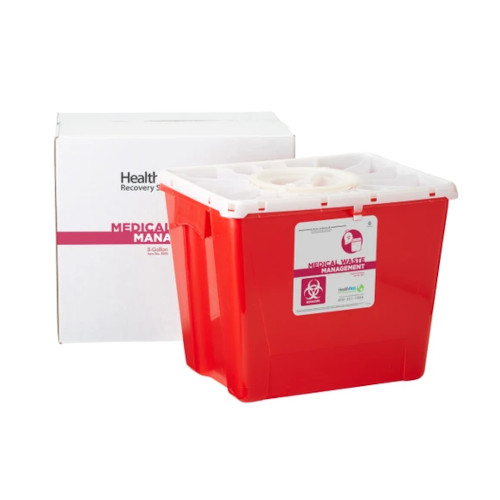Medical Waste Removal Quality: Your Trusted Companion in Safe Biohazard Disposal
Medical Waste Removal Quality: Your Trusted Companion in Safe Biohazard Disposal
Blog Article
The Importance of Proper Waste Disposal Practices
The management of waste is an important element of environmental stewardship that often goes undetected in our day-to-days live. Proper waste disposal practices are not simply a matter of comfort however are necessary for safeguarding our environments and public health. From the effects of incorrect waste disposal on our atmosphere to the long-lasting effects for future generations, the importance of embracing sustainable waste management techniques can not be overemphasized. By checking out the environmental effect of irresponsible waste disposal, the advantages of reusing campaigns, and the significance of area involvement in waste reduction efforts, a deeper understanding of why correct waste disposal techniques are important emerges.
Ecological Effect of Improper Disposal
Improper disposal of waste presents a considerable risk to the atmosphere as a result of its harmful impacts on ecological communities and human health and wellness. When waste is not properly handled, it can bring about air pollution of the air, water, and dirt, triggering injury to various plant and pet species. click here. Chemicals and toxic substances from poorly disposed waste can permeate right into the ground, infecting groundwater resources and impacting the health of both wild animals and people
Additionally, the buildup of waste in garbage dumps creates greenhouse gases like methane, adding to climate change and international warming. Improper disposal practices also result in littering, which not just deteriorates the visual worth of the atmosphere yet can also harm wildlife with consumption or entanglement.
To mitigate these ecological effects, it is critical for neighborhoods and people to adopt correct waste disposal practices such as recycling, composting, and liable contaminated materials disposal. By taking these actions, we can assist secure environments, maintain natural resources, and protect human health and wellness for future and current generations.
Advantages of Recycling Programs
On a regular basis joining recycling programs provides numerous advantages for both the setting and culture in its entirety. One of the crucial advantages of recycling is the preservation of natural deposits. By reusing products such as paper, glass, metal, and plastic, less basic materials require to be removed from the earth, leading to lowered logging, mining, and exploration tasks. This preservation of resources not only assists in preserving ecological equilibrium yet also contributes to sustainable advancement.
Furthermore, reusing plays a vital duty in minimizing energy usage and greenhouse gas discharges. The production of goods from recycled products generally needs less power compared to making from virgin resources - medical waste removal service. As an outcome, the carbon impact connected with the manufacturing process is substantially lowered, assisting in the fight versus environment modification
Additionally, recycling programs develop work opportunities in the recycling sector, advertising economic development and social welfare. By encouraging the recycling and reuse of products, these programs support a round economic situation that reduces waste generation and optimizes source effectiveness, eventually leading to a cleaner, greener future for generations ahead.
Contaminated Materials Monitoring Guidelines
Executing effective harmful waste monitoring standards is essential for minimizing environmental and health and wellness risks related to the improper disposal of hazardous products - click here. Appropriate handling, therapy, and disposal of contaminated materials are necessary to avoid contamination of dirt, water resources, and air
One trick standard is proper labeling of harmful waste containers to make sure secure handling and transport. In addition, facilities need to adhere to rigorous storage space requirements to stop leakages, spills, or accidents that can endanger human wellness and the setting. Normal training programs for workers on contaminated materials administration practices are also important to ensure conformity with regulations and promote a society of safety.
Additionally, unsafe waste should be segregated based upon its buildings to avoid chemical responses that can result in unsafe scenarios. Implementing a comprehensive waste tracking system can assist monitor the motion of harmful materials from generation to disposal, making sure openness and liability. By adhering to these standards diligently, businesses and markets can add to a much safer and cleaner setting for future and present generations.
Community Participation in Waste Decrease
To effectively address the environmental and wellness risks related to contaminated materials monitoring, engaging the neighborhood in waste reduction campaigns is extremely important. Community involvement plays a vital duty in promoting lasting waste monitoring methods and promoting a society of ecological duty. By enlightening locals regarding appropriate waste partition, recycling, and composting methods, neighborhoods can dramatically lower the quantity of waste sent out to garbage dumps, consequently lessening ecological air pollution and saving all-natural sources.
Area engagement in waste decrease programs additionally assists in increasing recognition about the value of waste reduction and motivates individuals to adopt eco-friendly practices in their day-to-days live - medical waste disposal. Joint efforts between neighborhood authorities, waste administration business, and area participants can bring about the implementation of reliable waste decrease methods tailored to the details demands of each neighborhood or town
Moreover, community engagement cultivates a feeling of ownership and responsibility among homeowners, encouraging them to take positive steps towards minimizing waste generation and advertising a cleaner, healthier environment for future and present generations. By working together in the direction of typical waste decrease objectives, areas can make a significant influence on mitigating the adverse effects of incorrect garbage disposal methods.

Future of Sustainable Waste Practices
Typical waste disposal methods, such as landfilling and incineration, are no longer lasting in the lengthy term due to their significant ecological effects. Moving onward, the future of sustainable waste practices exists in accepting a circular economic situation approach, where sources are reused, recycled, or repurposed to decrease waste generation.
Technical advancements play a vital role in forming the future of sustainable waste methods. Advanced waste sorting and recycling modern technologies can help boost the performance of waste management processes, enabling for the recovery of important sources from waste streams. Furthermore, the adoption of eco-friendly materials and composting techniques can help in reducing the amount of natural waste winding up in garbage dumps, therefore alleviating greenhouse gas discharges.
In addition, promoting customer understanding and education on correct waste partition and disposal practices is vital for driving behavioral adjustment in the direction of sustainability. By promoting a culture of waste reuse, recycling, and decrease, neighborhoods can collectively add to a cleaner and much healthier setting for future generations.

Final Thought
To conclude, appropriate waste disposal practices are essential for lessening ecological influence and advertising sustainability. By implementing recycling programs, managing contaminated materials correctly, and encouraging community participation in waste decrease efforts, we can work in the direction of a cleaner and much healthier atmosphere. It is important for governments, businesses, and people to focus on lasting waste techniques for the future well-being of our earth.

From the effects of inappropriate waste disposal on our setting to the long-lasting ramifications for future generations, the significance of embracing lasting waste management methods can not be overstated. wikipedia reference By exploring the ecological effect of reckless waste disposal, the advantages of recycling campaigns, and the relevance of community involvement in waste reduction initiatives, a much deeper understanding of why appropriate waste disposal techniques are vital arises.
By educating locals about correct waste segregation, reusing, and composting strategies, neighborhoods can considerably minimize the quantity of waste sent to land fills, therefore minimizing environmental contamination and saving natural sources. (click here)
Relocating onward, the future of sustainable waste practices exists in accepting a round economy technique, where resources are recycled, recycled, or repurposed to minimize waste generation.
Advanced waste sorting and reusing technologies can help improve the performance of waste administration procedures, allowing for the recuperation of valuable sources from waste streams.
Report this page